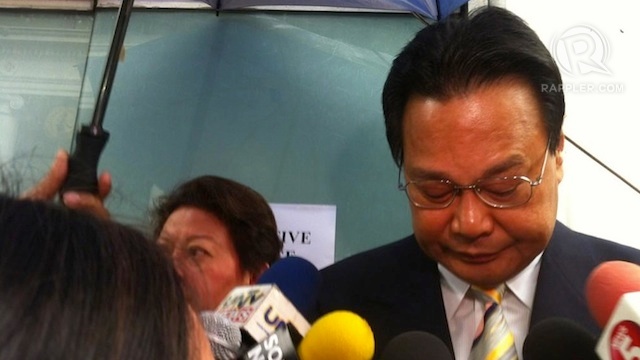SUMMARY
This is AI generated summarization, which may have errors. For context, always refer to the full article.

MANILA, Philippines [UPDATED] – The Department of Justice on Thursday, May 2, recommended the filing in court of tax evasion charges against dismissed Chief Justice Renato Corona.
The DOJ found probable cause to charge Corona with failing to both pay P120.5 million in taxes and file his income tax return for 6 years – 2003, 2004, 2005, 2007, 2008 and 2010 – for the income he got outside of his compensation as a Supreme Court justice in the said years.
The charges are based on a Bureau of Internal Revenue case that was filed with the DOJ in August 2012.
The BIR scrutinized Corona’s statement of assets, liabilities and networth submitted to the impeachment court in 2012. Corona became the subject of impeachment after he was accused by the House of Representatives of failing to truthfully declare P42.1 million-worth of properties in his 2004, 2005 and 2009 SALN and for also not disclosing P180 million in peso and dollar deposits.
It would be the first court case against Corona after he was relieved from his post last May 29 following his failure to declare his bank deposits. The Senate, sitting as an impeachment court, found him guilty of culpable violation of the Constitution.
Corona was accused of violating section 254 and 255 of the National Internal Revenue Code from 2003 to 2005, 2007, 2008 and 2010.
The BIR said Corona underdeclared his the value of his cash assets from 2003-2010 by 30% or by P546 million and his real estate properties by P17.3 million. He also failed to declare properties worth P12.7 million in his SALN. According to the BIR’s re-computation of Corona’s assets, the dismissed chief justice’s networth from 2002-2010 is P576.7 million. Corona only declared a networth of P108.7 million for the said period.
Corona’s defense
Corona said, however that he could not expect any “fairness” from De Lima, who testified against him in the impeachment trial.
“Was there ever any doubt about the outcome of this charade? My savings are the result of 45 years of diligent work in the private and public sectors,” he said.
“I do not owe any tax liability to the government. I have never in all my life received even a single notice of deficiency assessment from the BIR. The contrived claims of the BIR will fall falt on its face because they are without legal, factual moral bases and are just part of the continuing political harassment and persecution that they have been incessantly inflicting on me.”
Corona said the BIR erred in charging him tax evasion because it failed to take into account that part of his funds in his bank accounts came from family members. He added he was deprived of his right to due process because he was not given the opportunity to defend himself during the BIR’s preliminary and formal investigation in 2012.
He also raised that the filing of criminal charges against him in relation to the taxable years of 2002-2007 has also already prescribed and that the waiver he signed allowing government to look at his bank accounts has lost its legal force after he was impeached.
He also said that the method used by BIR was faulty – the tax agency used the Net Worth Method, where “Increase in net worth plus non-deductible expenses, minus non-taxable receipts, equals taxable net income.” (See article of PCIJ explaining the said method: “How to track, crack cases“).
The DOJ said, however that Corona failed to produce evidence that money in his bank accounts came from family members. “On the other hand, the BIR sufficiently proved that there is probable cause to believe that the increase in his net worth came from sources which are taxable,” the DOJ said.
“As a member of the Supreme Court at that time, he is prohibited from obtaining compensation from other sources, yet his bank accounts alone are grossly disproportionate to his earnings as a Justice of the High Court.”
The prosecution panel also disagreed with him that his right to due process was violated. They said the participation of the respondent in the preliminary investigation is not required.
As to the period of prescription, the DOJ clarified that it starts not at the commission of the crime, but at the discovey of the said commission of the crime.
The panel also said the Net Worth method can be used if “there is no method regularly employed by the taxpayer in the keeping of his books.”
The DOJ said there is a pattern of “underreporting large amounts of income,” adding a case against Corona must be filed at the Court of Tax Appeals. – Rappler.com
Add a comment
How does this make you feel?
There are no comments yet. Add your comment to start the conversation.